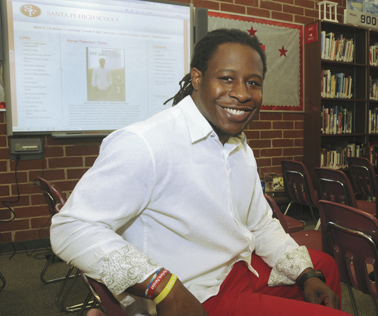
SUZETTE COOK/Alachua County Today
Santa Fe High School 1997 graduate and former NFL football playher Adrian Peterson visited Santa Fe High School to speak about his new book "Don't Dis My Abilities" recently.
ALACHUA – Adrian Peterson, 34, is walking down the hallway at Santa Fe High School like he never left. The 1997 graduate and all-star football and basketball player is home after all. Next to him is a student pushing a rolling cart with a box of books on it. This time, Peterson is more than a famous athlete. He’s an author bringing his own book to the Raider media center.
“The library still looks the same,” Peterson says to the students in front of him. “It still smells the same, just the people are different.”
And then he begins to talk of his journey.
“I am living proof of hard work,” he says. “That being from Alachua, Florida, I grew up with a speech impediment, had a big dream and made it to the NFL.”
Peterson started dreaming of becoming an NFL player at the age of six, he says. “But I didn’t get drafted until I was 21 years old,” he adds.
He remembers what it was like struggling when he spoke with a stutter in class. “I always wanted to speak clearly,” he says. “I could hear kids in the background laughing and snickering, and I remembered what my parents told me. ‘You go to school to learn, not to make friends.’ ”
Peterson played for four years as a Raider and won a state title before becoming the first sophomore at Georgia Southern University to win two National Championships in 1999 and 2000.
After he graduated college, Peterson was drafted by the Chicago Bears in the sixth round. He played for eight years, including the 2006 NFC Championship season and Super Bowl XLI, and ran for over 1,200 yards in his career.
Santa Fe High invited Peterson to come by and talk about his new autobiography “Don’t Dis My Abilities” which talks about his success as a football player, as well as his current difficulty with a speech impediment and infant daughter’s medical issues.
The visit was made possible by a donation the media center received from Dollar General, Media Specialist Georgeanna Moore, says. “In the fall, we received a phone call from Dollar General saying that we’d been selected as a literacy program they would like to donate to,” Moore says. “So they came out and there were kids in the media center, teachers came in from the copy room. They handed me a check for $40,000.
“So since then, we call it literacy explosion,” Moore says. “We are trying to do something to get the kids motivated to read and into studying.”
A projected image of the cover of Peterson’s book shines on one wall as he speaks. Students are leaning in listening to his stories and advice.
When he wants to make a point he repeats it.
“Start a habit,” he says. “Start a habit. A habit is something that is hard to break.
Instead of going home and getting on your Smartphone or facebook, read a little bit.”
Peterson knew he would need to speak in public one day, he says. So he continued to take speech classes. “In high school, I did interviews with the Gainesville Sun and TV 20, he says. “At Georgia Southern, I went from doing seven interviews my entire high school career to seven or eight interviews in a day with media such as ESPN.
Interviews intensified when Peterson spoke as a Chicago Bear player after games. “In one interview session there’d be 20 microphones, 20 pens and papers, 20 video cameras in front of you,” he says.
“I knew one day I would need to express myself.”
Peterson offers more advice to the students.
“It’s okay to look up to a professional athlete,” he says. “But find someone you can touch. Find someone who does it the right way, every day.”
Go to school, make good grades, take the right classes and put yourself into the right position so when a university calls and offers you a scholarship, you’re ready.”
I am proud of myself for having perfect attendance from 2nd to 8th grade,” Peterson says about why going to school is so important. “If you see it and listen to it in class, you’ll learn it.”
A student asks Peterson about how he wrote his book.
“It started off as a hobby,” he says.
“Just put your ideas on paper. Don’t worry about punctuation, just get your ideas on paper. A week here, put it away and come back to it. A month here, in between flights. Off season and then, one day I looked up and I had 30 pages.
“I wrote mostly on the computer, but sometimes when I didn’t have a laptop, I would think of an idea and then put it on my iphone and when I got back to the computer, I would write it out.”
Students asked Peterson about his education, family and current work. “I own a small trucking company, started a youth flag football team in Chicago and stay at home with four kids,” he says.
“I graduated before my last collegiate football game,” he says. “So if the NFL didn’t want me, I still had a plan B which was a degree in recreation and a minor in sociology.”
Students applauded at the end of Peterson’s presentation and he visited with them and posed for photographs before the next class arrived.
Sophomore Austin White said he learned a lot from Peterson. White, 16, plays center on the Raider football team.
“Always keep a strong work ethic,” he said about Peterson’s advice. “School comes first, work hard and stay strong.”
# # #
Email scook@
alachuatoday.com



 SUZETTE COOK/Alachua County Today
SUZETTE COOK/Alachua County Today 
 SUZETTE COOK/Alachua County Today
SUZETTE COOK/Alachua County Today